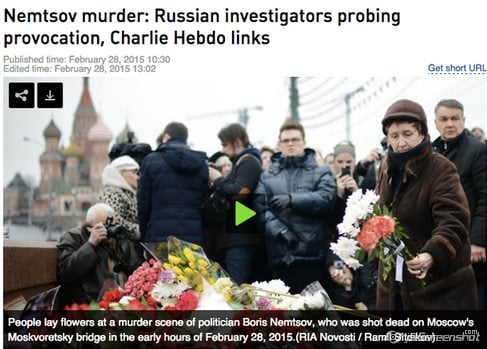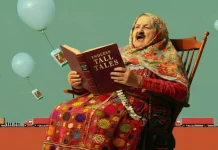RT’s headlines about the shooting death of opposition figure Boris Nemtsov portray Russian investigators at work pursuing a broad range of theories about who is behind the contract-style killing. Nemtsov’s death may have been “a sort of ‘sacral sacrifice’ by those who don’t hesitate to use any methods to reach their political goals,” said one investigation official, according to RT.
RT’s headlines about the shooting death of opposition figure Boris Nemtsov portray Russian investigators at work pursuing a broad range of theories about who is behind the contract-style killing. Nemtsov’s death may have been “a sort of ‘sacral sacrifice’ by those who don’t hesitate to use any methods to reach their political goals,” said one investigation official, according to RT.
Other theories under investigation: Nemtsov was murdered for something he said about the Charlie Hebdo attacks in France (RT does not explain). Or, for his outspoken criticism of Russian involvement in the Ukrainian conflict. Or, business interests may have targeted him for his anti-corruption work. Or it might have been some sort of personal vendetta.
What RT is at pains to deflect is speculation about Kremlin involvement. In interviews on RT news shows, speakers — like Aleksandra Nerozina, identified as a London-based journalist about six minutes into this broadcast — denounce suggestions the Kremlin might be connected to the death of one of its fiercest opponents.
Nerozina calls blaming the Kremlin or President Vladimir Putin “absolute nonsense from any point of view.” She suggests that “We should be waiting for the results” of an official investigation before jumping to any conclusions, but also says, “I won’t be surprised if some proof will be eventually found against Western counterparts.” Nerozina then tosses her own speculation into the discussion: maybe the Ukrainian government, the CIA, or Britain’s MI6 intelligence agency are behind Nemtsov’s killing.
Though the term “provocation” is used repeatedly to describe the murder, RT’s coverage does little to explain what it means by provocation (by whom? of what?).
RT does quote Vladimir Markin, spokesman for the Investigative Committee on Nemtsov’s death:
“The murder could be a provocation to destabilize the political situation in the country. Nemtsov could have been chosen as a sort of ‘sacral sacrifice’ by those who don’t hesitate to use any methods to reach their political goals,” he said.
RT also describes the bullets used and the getaway car, which investigators say had Ingush plates. Ingushetia is a predominantly Muslim region of Russia, which has tense relations with its Muslim minorities.
The article fails to mention Putin’s track record with political opposition and investigative journalists.
By Pola Lem, RTwatch





